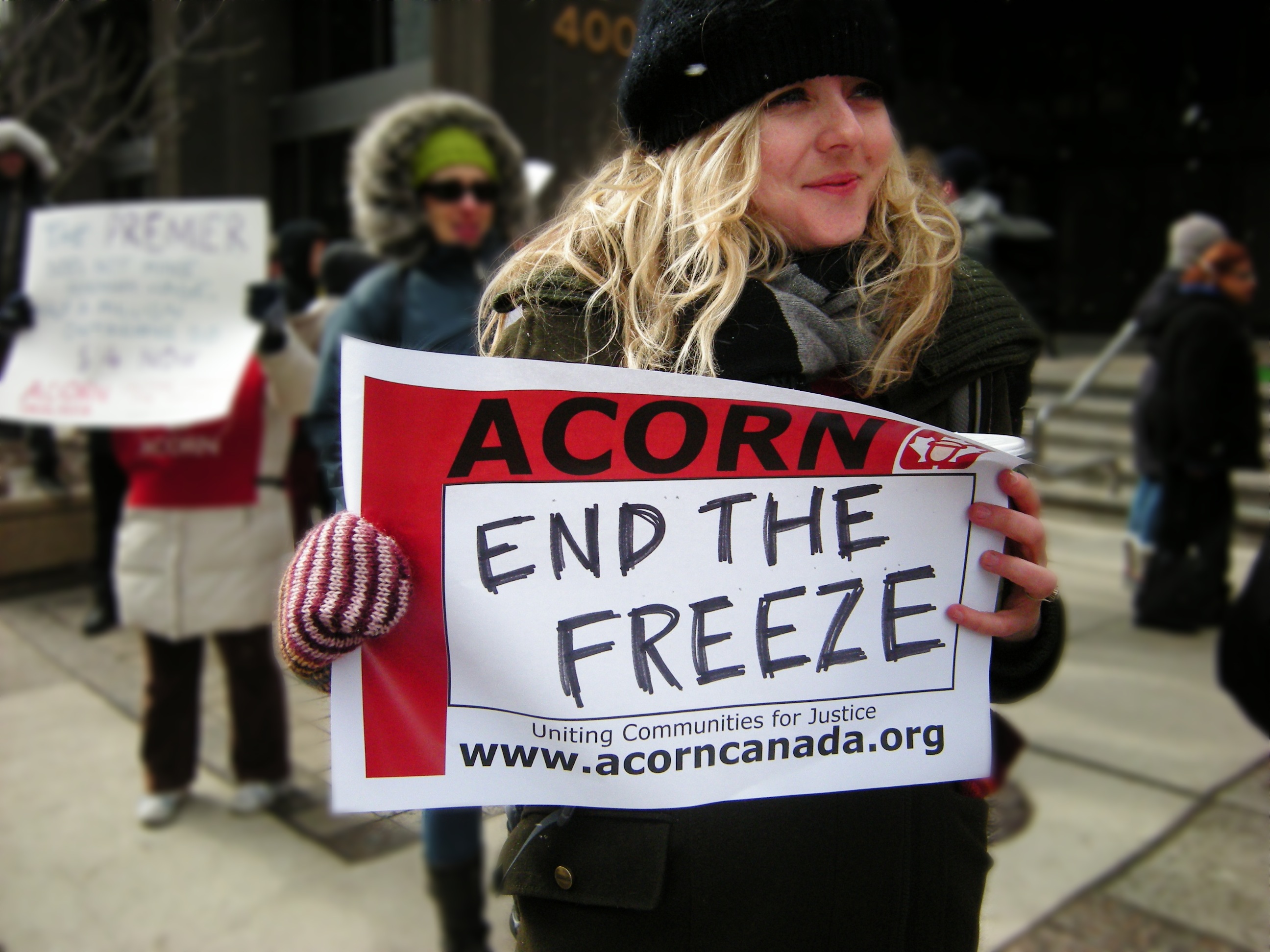Unfreeze minimum wage. Increase it to $14 an hour. Then index it to the rate of inflation.
Sounds simple enough.
The only question now is whether the Wynne Liberals will listen to anti-poverty and labour groups or bow to pressure from the business community who say an increase will only lead to cutbacks in the number of minimum wage workers.
The answer should be in the spring budget.
Meanwhile, the Campaign to Raise the Minimum Wage took their fight to the steps of the Ministry of Labour on Thursday, calling for an immediate 37 per cent increase to Ontario’s minimum wage which, they said, will only bring minimum wage earners 10 per cent above the poverty line.
The rally in Toronto was only one of 13 similar actions in cities across the province on Thursday.
The Campaign to Raise the Minimum Wage is coordinated by ACORN, Freedom 90, Mennonite New Life Centre, OCAP, Parkdale Community Legal Services, Put Food in the Budget, Social Planning Toronto, Toronto and York Region Labour Council and the Workers’ Action Centre.
Minimum wage has been frozen for three years.
“Yet the gas prices haven’t been frozen,” said Deena Ladd, co-ordinator, The Workers’ Action Centre. “Our transit (costs) haven’t been frozen. And the price of food hasn’t been frozen.”
Forcing minimum wage workers deeper into poverty. Presently, an Ontario worker earning minimum wage lives 19 per cent below the poverty line.
“And that is shameful,” said Ladd. “A job when you’re working full time should bring you out of poverty.”
But Nicole Mason, who works two jobs (one full-time and one part-time) to take care of herself and her two children, still has a difficult time making ends meet.
“People are spending more time working and less time raising their kids,” said Mason.
Seriously impacting their quality of life.
“$10.25 cannot give you a decent life,” said Marcelle Daniels, a member of the Workers’ Action Centre. At that rate, it took Daniels almost six months just to buy herself a new pair of rain boots.
Minimum wage workers can’t keep up with the cost of living when their wages are frozen but their rent increases are indexed to at least the rate of inflation.
“So we pay more for our homes but we don’t get any more money in our salaries,” said Kay Bisnath, president, Acorn Canada.
Up to this point, their plight has fallen on deaf ears at Queen’s Park. But anti-poverty activists expect more from Kathleen Wynne, the self-described social justice premier
“I’m tired of seeing the government and the media play the poor against each other,” said Lily Baumgarten of Put Food in the Budget.
The Put Food in the Budget campaign believes every person in Ontario has a right to an income that ensures a person can live a life of health and dignity.
“We are all deserving. We all deserve a better salary. Better social assistance rates. And we have to fight together for these things.”
Low social assistance rates and minimum wages, said Baumgarten, are part of a strategy to keep people in perpetual poverty, to keep them down, so they can easily be exploited by those with power.
Since the minimum wage was frozen three years ago, gas prices have risen 24 per cent, egg prices 21 per cent, transit 10 per cent and baked goods 12 per cent.
“So all of these items that we need to survive on have gone up massively,” said Ladd. “Why is there no freeze on transit, on rent, on gas, on food?”
All of which has forced many to use public transit only when absolutely necessary, fall behind on rent and rely on food banks, drop-ins and meal programs.
Programs that were only meant to last a couple of years during the early 1990s recession.
Freedom 90, Ontario’s new “union” of food bank and emergency meal program volunteers, wants their members to retire from volunteering at food banks or emergency meal programs before they reach 90 years of age.
For 20 years, they’ve been working on the front lines.
“A lot of them are seniors who feel that the government has abdicated its responsibilities for providing adequate incomes and affordable housing so that people can afford food (too),” said Yvonne Kelly of Freedom 90.
“Because that’s the one thing people won’t buy if they can’t afford it.”
More than 400,000 households in Ontario rely on food banks. Almost half of them have at least one family member working full time. And almost a third list work as their main source of income.
“So it’s a myth that people come to food banks because they just want to,” said Kelly.
“They’re coming because they need to and it’s an undignified and unnecessary way for them to lead their lives.”
A delegation from today’s rally delivered a $10 bill encased in a block of ice to the office of the Minister of Labour.
“A campaign to raise the minimum wage is vitally needed at this particular time,” said John Clarke, an organizer with the Ontario Coalition Against Poverty.
“Raising the minimum wage must be a priority (for the government) not for a study, not for a commission, but for action. People cannot be left in poverty whether they receive their poverty in the form of a welfare cheque or a pay cheque.”
Or the inequality gap will continue to grow.
Three years ago, through the dedicated and coordinated efforts of all stakeholders, minimum wage was increased from $9.50 to $10.25 an hour.
“That needs to happen again,” said John Campey, executive director, Social Planning Toronto.




